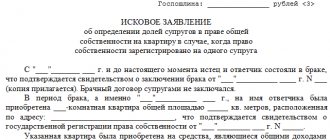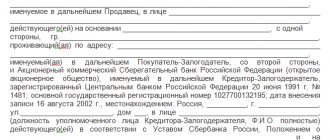Legal forms of restriction
Every citizen of the Russian Federation is endowed with inalienable housing rights. The Housing Code and special federal acts make it possible to develop legislation in general in this area. Some of these provisions allow for the introduction of certain restrictions.
Attention! We are talking not only about legislative acts, but also about special regulations. If necessary, they are included in the Housing Code, which is adjusted in this way if necessary.
Only if it is necessary to protect the following regulated objects, restrictions are applied:
- State security.
- Country defense.
- Interests of citizens.
- Citizens' health.
- The moral character of citizens.
- The structure of the state according to the Constitution of the Russian Federation.
The term “limitation of housing rights” has several interpretations:
- When protection of higher order rights is required, some options in the field of housing law are excluded.
- Set special boundaries and restrictions.
- Housing legal relations are kept within a special framework in order to restrain the destructive activities of some individuals.
- Some rights are withdrawn from the terms of reference of individuals and legal entities.
These are equivalent definitions that can complement each other.
Finally, here are some examples of acceptable restrictions:
- Residents of an apartment building cannot carry out major redevelopment without the approval of a special inspection.
- Responsibilities for maintaining and cleaning the common area.
- The owner is obliged to adhere to certain regulations if the status of the object changes.
- Taking part in meetings.
Reference! Lawyers say that the legislative norms themselves can be considered as restrictions. An example of the approval of redevelopment has already been given above. This is also a kind of limitation that continues to apply to everyone. The main thing is that the rights of other citizens are not violated and that there is no danger to the state.
Responsibility
Punishments for illegal actions include more than just fines. In case of repeated incidents and ignoring simple instructions, the citizen may be evicted from the occupied area. If necessary, owners of common property may demand compensation for damage caused, not only moral, but also material.
Civil liability may arise for citizens who enter into a transaction in violation of the requirements established at the legislative level . As a result, each party will be required to return what they received.
There is no criminal liability for violations in this area. It applies only when the right to integrity is violated - the commission of any actions against the will of the owners or illegal entry. In this case, the fine may increase to 40 thousand rubles.
Acceptable types of punishment are arrest for up to 3 months or correctional labor for 1 year or more. Fines increase to 200 thousand rubles in the presence of threats and violence when the actions were committed. 300 thousand rubles - a fine if the crime was committed with the help of an official position. Then the period of forced labor increases along with the permissible arrest - up to 3 years.
What does this mean
According to Constitutional Law, every person can count on:
- Providing a safe and healthy environment for those living in houses and apartments.
- Improve conditions if necessary.
- Inviolability of housing.
- Stable use of available space.
- Having a place where you can permanently stay.
Local executive authorities should encourage construction to implement the rights described.
For this purpose, the market itself is developing, for which funds are constantly being allocated. But the Constitution does not say that absolutely all citizens must be provided with housing. They themselves have the right to change their conditions using their own finances, attracting additional help. An exception is made for the poor and other categories who need additional support. Important! The inadmissibility of arbitrary deprivation of housing is one of the additional guarantees in the Constitution in this area. This means that eviction can only be based on court decisions and in other situations specified at the legislative level.
When authority is violated
According to the Housing Code of the Russian Federation, a person can be found guilty of a violation in this area if at least one of the conditions listed below is present:
- Residential premises are not used for their intended purpose.
- Unauthorized redevelopment is taking place.
- Residential and local areas, equipment and landscaping elements are deliberately damaged.
- Citizens need improved housing conditions, but they violated the registration procedure. Or the violation is related to the provision of premises to other persons for residence.
- The rules for operating residential apartments and other similar facilities have been violated.
- Check-in deadlines are not met.
- The rules for using the facilities have been violated.
In matters of establishing responsibility for these offenses, the Housing Code is closely related to the administrative one. This also applies to phenomena that are not called dangerous actions. The minimum fine will be 1,500 rubles, the maximum figure can be much higher.
There are other actions that are associated with civil liability:
- The apartment or house is not used for its intended purpose.
- The rights and interests of neighbors are systematically violated.
- The living space is deteriorating and being destroyed.
- The employer does not pay for services for six months or more.
Content and essence
In the Russian Federation, the Constitutional right to housing is a multidimensional phenomenon. This is due to implementation in various legal relations. Usually they are civil and administrative, constitutional.
This right is acquired from birth and is an integral part of the life of every person and citizen.
The direction also has some specific properties, including:
- Citizens are vested with rights without strict individualization. The state undertakes to create the conditions under which rights are realized. The same applies to local governments.
- Law arises directly from law.
At the same time, the implementation of rights presupposes a certain sequence of actions performed by the state and the individual himself.
It is also useful to read: Social human rights based on the Constitution of the Russian Federation
Examples of violation
An example is when neighbors appear in the house, spoiling the entrance with obscene inscriptions or because of whose repairs others suffer. And dealing with such citizens can be difficult. But the law presupposes liability for those who violate the established rules.
Such violations usually lead to administrative liability.
Here are just examples of some of the disputes that may arise between citizens and organizations:
- Regarding the management of an apartment building.
- Use of residential premises.
- Collection of payments for housing and utilities.
- Eviction from housing and deregistration in violation of the general procedure.
- Privatization of living space.
- Recognition of property rights.
Reference! Here we must rely not only on the concepts in the Housing Code, but also on the Civil Code. If it is impossible to establish a compromise, each of the interested parties can appeal to the court.







